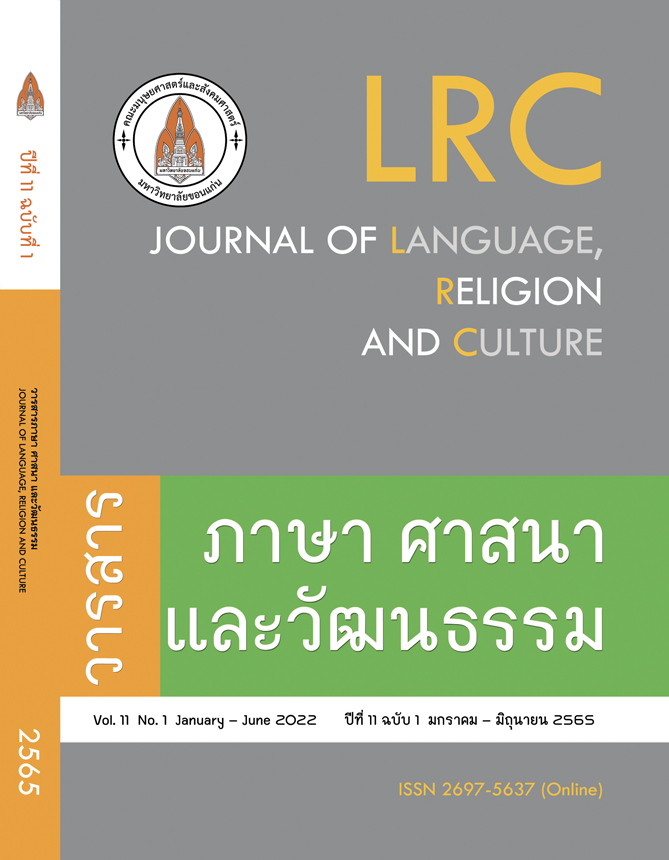การทำร้ายในฐานะของการดูแลตัวเอง: ชีวิตและการดิ้นรนทางศีลธรรมของผู้อยู่ร่วมกับ(โลก)ซึมเศร้า
การทำร้ายในฐานะของการดูแลตัวเอง: ชีวิตและการดิ้นรนทางศีลธรรมของผู้อยู่ร่วมกับ(โลก)ซึมเศร้า
คำสำคัญ:
จริยศาสตร์, ตัวตนเชิงศีลธรรม, จริยศาสตร์ในมุมมองบุคคลที่หนึ่งบทคัดย่อ
บทความชิ้นนี้ได้สำรวจโลกชีวิตทางศีลธรรมของ ‘มีนา’ ผู้อยู่ร่วมกับ(โลก)ซึมเศร้าชาวมลายูมุสลิมในพื้นที่ชุมชนสายหมอก (นามสมมติ) จังหวัดยะลา ด้วยการสัมภาษณ์เรื่องเล่าความเจ็บป่วย เพื่อสร้างข้อถกเถียงกับมุมมองเชิงศีลธรรมกระแสหลักแบบเดอร์ไคร์เมียน (หรือมุมมองเชิงศีลธรรมแบบบุคคลที่ 3) ที่มักฉายภาพศีลธรรมเป็นเรื่องของสิ่งที่ดำรงอยู่ภายนอกตัวบุคคล และผู้กระทำการเชิงศีลธรรมมีพันธะในการกระทำตามกฎบรรทัดฐานและประเพณีที่ตนสังกัดอยู่ ซึ่งไม่เพียงลดทอนปรากฏการณ์เชิงศีลธรรมให้เป็นเรื่องทวิลักษณ์เชิงศีลธรรมของความดี/ชั่ว ปรกติ/พยาธิสภาพ ดูแล/ทำร้าย หากแต่ยังบดบังศักยภาพกระทำการของปัจเจกบุคคล ในการสรรหาเทคนิควิธีและเปลี่ยนแปลงตัวตนเชิงศีลธรรมเพื่อสร้างชีวิตที่ดีเท่าที่เป็นไปได้ภายในสถานการณ์ที่ตนกำลังเผชิญอยู่
เรื่องเล่าชีวิตของมีนาการกระทําเชิงศีลธรรมและการตัดสินใจเชิงศีลธรรมมิไดถูกกํากับควบคุมโดยกฎหรือบรรทัดฐานทางสังคมอย่างเบ็ดเสร็จเด็ดขาด หากแตการกระทําเชิงศีลธรรมเปนสิ่งที่ถูกหลอหลอมอยูภายในปฏิบัติการและความสัมพันธ์ที่เกิดขึ้นในชีวิตประจำวัน บทความชิ้นนี้จึงได้เสนอให้หันมาพิจารณาชีวิตทางศีลธรรมด้วยกรอบทัศน์เชิงศีลธรรมแบบมุมมองบุคคลที่หนึ่งของเชอรีล แมตติงลีย์ ที่ซึ่งพิจารณาศีลธรรมเป็นเรื่องของการบ่มเพาะภูมิปัญญา และการทดลองสรรหาเทคนิควิธีต่างๆ กับชีวิตของตัวเอง ที่แม้บางครั้งอาจขัดหรือแย้งกับบรรทัดฐานกระแสหลัก หรือแม้แต่เป็นอันตรายต่อตัวเอง อย่างเช่น การใช้สารเสพติด การทำแท้ง มาใช้คลี่คลายและรับมือกับความทุกทนข์และความอิหลักอิเหลื่อเชิงศีลธรรมที่เกิดขึ้นในชีวิตประจำวัน เพื่อสร้างจินตภาพใหม่เกี่ยวกับตัวตนและนำไปสู่ชีวิตที่ดีตามทรรศนะของผู้กระทำการเชิงศีลธรรม หรืออย่างน้อยก็เพื่อช่วยให้ปัจเจกบุคคลสามารถกลับไปใช้ชีวิตได้อย่างปรกติในโลกจริตทางศีลธรรมที่คุ้นเคย ซึ่งภายใต้กรอบทัศน์ดังกล่าวช่วยให้เราเข้าใจว่าศีลธรรมเป็นสิ่งที่ก่อตัวอยู่ภายในความสัมพันธ์ที่เกิดขึ้นในชีวิตประจำวัน ในแง่นี้การมีชีวิตที่ดีและสิ่งที่ดีจึงควรถูกพิจารณาและนิยามโดยสัมพันธ์บริบทและสถานการณ์แวดล้อมที่โอบล้อมโลกชีวิตทางสังคมของผู้กระทำการเชิงศีลธรรมแต่ละคน หาใช่เป็นความบิดเบี้ยวทางโลกทัศน์ของผู้อยู่ร่วมกับ(โลก)ซึมเศร้าหรือความล้มเหลวทางศีลธรรมของศาสนิกแบบตรงไปตรงมา
เอกสารอ้างอิง
ชลิตา บัณฑุวงศ์. (2560). ชีวิตทางศาสนา กับสถานภาพและบทบาทของ “ผู้หญิงกำปง” ในหมู่บ้านมลายูมุสลิมชายแดนใต้. วารสารธรรมศาสตร์, 36(3), 217–241.
พิชัย อิฏฐสกุล และศิริไชย พงษ์สงวนศรี. 2558. โรคซึมเศร้า. ใน มาโนช หล่อตระกูล และปราโมทย์ สุคนิชย์ (บรรณาธิการ), จิตเวชศาสตร์ รามาธิบดี (พิมพ์ครั้งที่ 4). (น. 167– 189). กรุงเทพฯ: ภาควิชาจิตเวชศาสตร์คณะแพทยศาสตร์โรงพยาบาลรามาธิบดี มหาวิทยาลัยมหิดล.
มีนา (นามสมมติ). (2564, 5 ตุลาคม). ผู้อยู่ร่วมกับ(โลก)ซึมเศร้าในพื้นที่สายหมอก [บทสัมภาษณ์].
Biehl, J. (2005). Vita: Life in a zone of social abandonment. Berkeley: University of California Press.
Bloch, M. (1973). The long term and the short term: The economic and political significance of
the morality of kinship. In J. Goody (Ed.), The character of kinship (pp. 75–87). Cambridge: Cambridge University Press.
Buchbinder, M. (2010). Giving an account of one’s pain in the anthropological interview. Cult Med Psychiatry, 34(1), 108–131.
Burraway, J. (2018). Remembering to forget: Blacking out in Itchy Park. Current Anthropology, 59
(5), 469–487.
Cresswell J. W., & Clark V. L. (2011). Designing and conducting mixed method research. Thousand Oaks: Sage.
Das, V. (2015). Affliction: Health, disease, poverty. New York: Fordham University Press.
Davis, N. J. (1972). Labeling theory in deviance research: A critique and reconsideration. The Sociological Quarterly, 13(4), 447–474.
Dorairajoo, S. (2009). Peaceful Thai, violent Malay(Muslim): A case study of the ‘problematic’ Muslim citizens of southern Thailand. The Copenhagen Journal of Asian Studies, 27(2), 61–83.
Durkheim, E. (1982). The rules of sociological method. (W. D. Halls, Trans.). New York: The Free Press.
__________. (1933). The division of labor in society (G. Simpson, Trans.). New York: The Macmillan Publishing.
Foucault, M. (2008). The birth of biopolitics: Lectures at the Collège de France, 1978–1979. (M. Senellart, Ed.). Basingstoke: Palgrave Macmillan.
__________. (1998.) Technologies of the self. In P. M. Rabinow (Ed.). Ethics, subjectivity and truth. (Essential works of foucault, 1954–1984, Vol. 1) (pp. 225–251). New York: The New Press.
Frisk, S. (2009). Submitting to God: Women and Islam in urban Malaysia. Minneaplois: University of Minnesota Press.
Garcia, A. (2014). The promise: On the morality of the marginal and the illicit. ETHOS, 42(1), 51–64.
________. (2010). The pastoral clinic: Addiction and dispossession along the Rio Grande. Berkeley: University of California Press.
Klanarong, N. (2009). Border crossing of Muslim women in southern-border provinces of Thailand. Asia Pacific Viewpoint, 50(1), 74–87.
Klenk, M. (2019). Moral philosophy and the ‘ethical turn’ in anthropology. Zeitschrift für Ethik und Moralphilosophie, 2, 331–353.
Laidlaw, J. (2014). The subject of virtue: An anthropology of ethics and freedom. Cambridge: Cambridge University Press.
Lambek, M. (2010). Introduction. In M. Lambek (Ed.), Ordinary ethics: Anthropology, language, and action (pp. 1–36). New York: Fordham University Press.
Mattingly, C. (2014). Moral laboratories: Family peril and the struggle for a good life. Berkeley: University of California Press.
__________. (2013). Moral selves and moral scenes: Narrative experiments in everyday life. Ethnos 78(3), 301–327.
__________. (2012). Two virtue ethics and the anthropology of morality. Anthropological Theory, 12(2), 161–184.
Mattingly, C., & Throop, J. (2018). The anthropology of ethics and morality. Annual Review of Anthropology, 47, 475–492.
McGuigan, J. (2014). The neoliberal self. Culture Unbound, 6(1), 223–240.
Mol, A. (2004). The logic of care: Health and the problem of patient choice. London: Routledge.
Ortner, S. (2016). Dark Anthropology and its others: Theory since the eighties. HAU: Journal of Ethnographic Theory, 6(1), 47–73.
Orru, M. (1983). The ethics of anomie: Jean Marie Guyau and Émile Durkheim. The British Journal of Sociology, 34(4), 499–518.
Plummer, K. (1983). Document of life: An introduction to the problems and literature of a humanistic method. London: Allen & Unwin.
Purewal, N. (2018). Sex selective abortion, neoliberal patriarchy and structural violence in India. Feminist Review, 119(1), 20–38.
Robbins, J. (2013). Beyond the suffering subject: Toward an anthropology of the good. Journal of the Royal Anthropological Institute, 19(3), 447–462.
________. (2007). Between reproduction and freedom: Morality, value, and radical cultural
change. Ethnos, 72(3), 293–314.
Rose, N. S. (2007). The politics of life itself: Biomedicine, power, and subjectivity in the twenty-first century. Princeton: Princeton University Press.
Segrin, C. (2000). Social skills deficits associated with depression. Clin Psychol Rev, 20(3), 379-403.
Spradley, J. P. (1980). Particpant observation. Orlando: Harcourt Brace Jovanovich.
Walker, H., & Kavedzija, I. (2015). Values of happiness. HAU: Journal of Ethnographic Theory, 5(3)
Widlok, T. (2004). Sharing by default? Outline of an anthropology of virtue. Anthropological Theory, 4(1), 53–70.
Zigon, J. (2010). Moral and ethical Assemblages: A response to Fassin and Stoczkowski Anthropological Theory, 10(1–2), 3–15.
______. (2009). Within a range of possibilities: Morality and ethics in social life. Ethnos, 74(2), 251–276.
______. (2008). Morality: An anthropological perspective. Oxford: Berg.
______. (2007). Moral breakdown and the ethical demand: A theoretical framework for an anthropology of moralities. Anthropological Theory, 7(2), 131–150.
Zigon, J., & Throop, J. (2014). Moral experience: Introduction. Ethos, 42(1), 1–15.
ดาวน์โหลด
เผยแพร่แล้ว
รูปแบบการอ้างอิง
ฉบับ
ประเภทบทความ
สัญญาอนุญาต
ลิขสิทธิ์ (c) 2022 วารสารภาษา ศาสนา และวัฒนธรรม

อนุญาตภายใต้เงื่อนไข Creative Commons Attribution-NonCommercial-NoDerivatives 4.0 International License.







